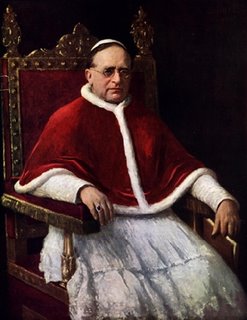Papal Quotes against Socialism

(Picture of Pope Pius XI)
Centesimus Annus in 1991:
“In recent years the range of such intervention has vastly expanded, to the point of creating a new type of state, the so-called ‘Welfare State.’ This has happened in some countries in order to respond better to many needs and demands by remedying forms of poverty and deprivation unworthy of the human person. However, excesses and abuses, especially in recent years, have provoke very harsh criticisms of the Welfare State, dubbed the ‘Social Assistance State.’ Malfunctions and defects in the Social Assistance State are the result of an inadequate understanding of the tasks proper to the State. Here again the principle of subsidiarity must be respected: a community of a higher order should not interfere in the internal life of a community of a lower order, depriving the latter of its functions, but rather should support it in case of need and help to coordinate its activity with the activities of the rest of society, always with a view to the common good.“By intervening directly and depriving society of its responsibility, the Social Assistance State leads to a loss of human energies and an inordinate increase of public agencies, which are dominated more by bureaucratic thinking than by concern for serving their clients, and which are accompanied by an enormous increase in spending, In fact, it would appear that needs are best understood and satisfied by people who are closest to them who act as neighbors to those in need. It should be added that certain kinds of demands often call for a response which is not simply material but which is capable of perceiving the deeper human need.”
Pius XI Ubi Arcano, issued in 1922:
“In view of this organized common effort towards peaceful living, Catholic doctrine vindicates to the State the dignity and authority of a vigilant defender of those divine and human rights on which the Sacred Scriptures and the Fathers of the Church insist so often. It is not true that all have equal rights in civil society. It is not true that there exists no lawful social hierarchy. Let it suffice to refer to the Encyclicals of Leo XIII, already cited, especially to that on State power, and to the other on the Christian Constitution of States. In these documents the Catholic will find the principles of reason and the Faith clearly explained and these principles will enable him to defend himself against the errors and perils of a communist conception of the State. The enslavement of man despoiled of his rights, the denial of the transcendent origin of the State and its authority, the horrible abuse of public power in the service of a collective terrorism, are the very contrary of all that corresponds with natural ethics and the will of the Creator, Who has mutually ordained them one to the other. Hence neither can be exempted from their correlative obligations, nor deny or diminish each other’s rights. The Creator Himself has regulated this mutual relationship in its fundamental lines, and it is by an unjust usurpation that communism arrogates to itself the right to enforce, in place of the divine law based on the immutable principles of truth and charity, a partisan political program which derives from the arbitrary human will and is replete with haste.”Pope Pius XI discussed the matter again in the aforementioned Divini Redemptoris
Pope Leo XIII, contained in such encyclical letters as Humanum Genus, Immortale Dei, Sapientiae Christianae, Libertas Praestimissimus, Mirare Caritatis, and Testem Benevolentiae (an apostolical letter)
Quas Primas, Divini Illius Magistri, Casti Connubii, and Divini Redemptoris Rerum Novarum and Quadragesimo Anno about the obligations of the State to base economic life on principles that reflect the binding precepts of the Divine positive law and the natural law, starting with the principle of subsidiarity

0 Comments:
Post a Comment
<< Home